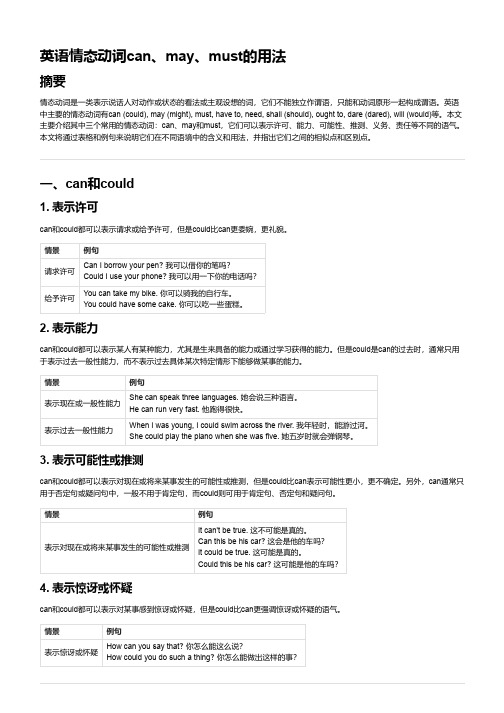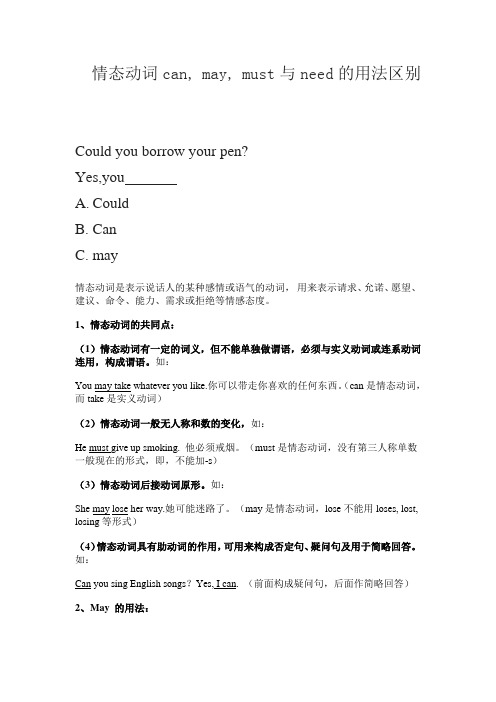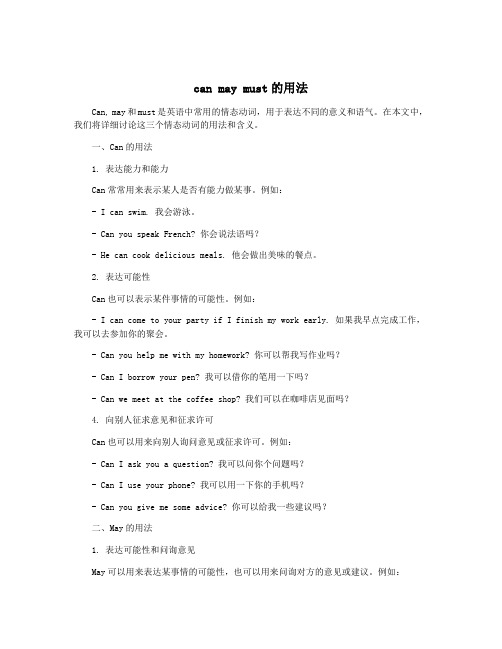情态动词can,may,must的用法.
英语情态动词can、may、must的用法

英语情态动词can、may、must的用法摘要情态动词是一类表示说话人对动作或状态的看法或主观设想的词,它们不能独立作谓语,只能和动词原形一起构成谓语。
英语中主要的情态动词有can (could), may (might), must, have to, need, shall (should), ought to, dare (dared), will (would)等。
本文主要介绍其中三个常用的情态动词:can、may和must,它们可以表示许可、能力、可能性、推测、义务、责任等不同的语气。
本文将通过表格和例句来说明它们在不同语境中的含义和用法,并指出它们之间的相似点和区别点。
一、can和could1. 表示许可can和could都可以表示请求或给予许可,但是could比can更委婉,更礼貌。
情景例句请求许可Can I borrow your pen? 我可以借你的笔吗?Could I use your phone? 我可以用一下你的电话吗?给予许可You can take my bike. 你可以骑我的自行车。
You could have some cake. 你可以吃一些蛋糕。
2. 表示能力can和could都可以表示某人有某种能力,尤其是生来具备的能力或通过学习获得的能力。
但是could是can的过去时,通常只用于表示过去一般性能力,而不表示过去具体某次特定情形下能够做某事的能力。
情景例句表示现在或一般性能力She can speak three languages. 她会说三种语言。
He can run very fast. 他跑得很快。
表示过去一般性能力When I was young, I could swim across the river. 我年轻时,能游过河。
She could play the piano when she was five. 她五岁时就会弹钢琴。
3. 表示可能性或推测can和could都可以表示对现在或将来某事发生的可能性或推测,但是could比can表示可能性更小,更不确定。
情态动词小结(共五则)

情态动词小结(共五则)第一篇:情态动词小结情态动词小结情态动词有:can(could),may(might),must,have to, shall(should),will(would),need, dare, ought to等。
一.情态动词can, may, must用法㈠基本用法1.can ⑴ 会,能够--Can you swim?--Yes, I can.--No, I can‟t.⑵口语中代替may.You can(may)park here.你可以把车停在这里。
(许可)2.may允许,许可--May I come in?--Yes, you may./Sure, come on in.--No, you mustn ‟t./No, you can‟t.No, you‟d better not.3.must必须--Must we finish the exercise today?--Yes, you must.--No, you needn‟t./No, you don‟t have to.4.need 需要,必需--Need you go now?=--Must you go now?--Yes, I must.--Yes, I must.--No, I needn‟t.--No, I needn‟t.(need作为情态动词,通常用在否定句和疑问句中。
)注意一:can 与be able to 都可以表示“能力”,区别是:⑴ can只有现在和过去两种形式I can play the piano.She couldn‟t play the piano when she was a little girl.⑵ be able to ①有更多的形式和时态We shall/will be able to finish the work next week.I haven‟t been able to find the book.②指具体一次活动I can swim but I am not able to cross the rough sea.有时两者可以互换: I‟m not able to(can‟t)answer your question.Are you able to(Can you)type(打字)?注意二:could的用法⑴ 作为can的过去式,表示过去的能力。
情态动词can could must may的用法

情态动词can, could的用法和区别一、情态动词can的用法1. 表示能力,意思是:能,会。
如:I can't swim. 我不会游泳。
Can you drive?你会开车吗?2. 表示客观可能性,意思是:可以,可能。
如:That big cinema can seats 2,000 people. 那家大电影院能坐2000人。
He can be very friendly at times. 有时他会很友好。
3. 表示允许(和may意思相近),意思是:可以,能够。
如:You can have the book when I have finished it. 书我看完了可以给你。
Can I use your pen?我可以用你的钢笔吗?4. 表示惊异、不相信等(用于疑问句、否定句或感叹句中),意思是:会,可能。
如:This can't be true. 这不可能是真的。
Can it be true?这可能是真的吗?二、情态动词could的用法1. 表示“能力”或“可能性”,作为can的过去形式。
如:Could you speak English then?那时你能讲英语吗?He said he couldn't follow me. 他说他跟不上我。
2. 表示惊异、怀疑、不相信等情绪。
如:Who could have taken them?谁会把它们拿走了呢?She couldn't have left so soon. 她不可能这么快就走了。
在这种情况下,could和can是可以换用的,用could时口气较缓和,用can时不相信的程度更强一些,两者在时间上没有差别。
3. 比较委婉客气地提出问题或陈述看法。
如:—Could you let me have your passport?—Yes, here it is.—看看你的护照好吗?—行,这就是。
I could come earlier, if necessary. 如果必要我可以早点来。
情态动词must, can, could, may, might表推测的用法

情态动词must, can, could, may, might表推测的用法:情态动词中的must, can, could, may, might都表推测。
其中must的可能性最大,can / could次之,may / might最小。
具体用法如下:1. must的用法(1)表示推测“可能性”时,意思是“一定、准是”,语气较肯定,较有把握。
He must be American. = It is certain that he is American. 他准是个美国人。
(2)must表推测只能用于肯定句。
如果要表示“一定不、肯定不”的意思时,应用can`t,如询问某种可能时,应用can。
He must know my address. 他肯定知道我的地址。
(一定)He can`t know my address. 他肯定不知道我的地址。
(一定不)Can he know my address? 他知道我的地址吗?(询问可能性)(3)must表示推测时,可以推测现在/正在发生的动作/过去发生的动作。
He must have a car now. (现在)他一定有辆小汽车。
He must be doing his exercises in the classroom.(正在进行)他一定在教室里做练习。
He must have finished the work.(过去发生)他一定已完成了工作。
注:must表示推测时很少用于将来的情况。
一般不用He must come tomorrow.可用It`s certain / I`m sure that he will come tomorrow. (4)在反意疑问句中,当附属部分含有表示推测意义的must时,疑问部分的助动词应与must后面的动词在非推测情况下的用法保持一致。
He must be a worker, isn`t he? (现在)他准时个工人,是吗?It must have rained last night, didn`t it? (过去)昨晚一定下雨了,是不是?You must have learned English for many years, haven`t you? (完成时)你一定学了好多年英语,是吗?2. can / could的用法(1)can表示推测“可能性”时,往往用于否定句或疑问句。
情态动词may,can,must

情态动词may,can,must情态动词:本身有一定的词义,表示说话人的情绪、态度、语气,但不能单独做谓语,只能和其他动词原形构成谓语。
常见的情态动词有may,can,must,need 等。
1.may:表可能性,用于肯定句中,意为“可能”He may be a good father but he may not be a good husband.2.can:(1)意为“能,会”,表示能力,可指某人拥有某种能力例:She can cook.(2)意为“可以”,表示许可,常用语口语,可以用may替代例:Can I have a look?(3)意为“可能”,表示推测,常用于否定句和疑问句,此时“can’t为“不可能”例:This pen looks like mine,yet it isn’t.Whose can it be?这支笔看起来是我的,但它不是,它可能是谁的呢?Tom can’t be his brother,I know all of his brothers.Tom不可能是他的兄弟,我知道他所有的兄弟。
3.must:(1)表有把握的推测,用于肯定句,表示“一定,准是”例:May and Mary must be twins.They really look like each other. (2)其否定形式mustn’t表示“禁止,不准,不允许”例: You mustn’t swim in the lake.(3)对must引导的疑问句回答①肯定回答用must②否定回答用needn’t 或don’t have to例:---Must I finish my homework?我现在必须完成作业吗?---No, you needn’t./ No, you don’t have to. 不,你不必。
(3)must have done一定做过某事例:I see Dad’s car downstairs.He must have come home.(4)must的反义疑问句部分:助动词英语must后面的动词在非推测情况下的用法保持一致例:He must be a worker,isn’t he?You must have learned English for many years,haven’t you?练习:()1.You ______ be very tired after a 13-hour flight from New York to Shanghai.A.canB. mayC. mustD.need()2.-I can’t find my key.-It _____ locked in your room.A.mayB.maybeC.may beD.perhaps()3.-Who told him about this news?Lily?-It ____ her.She doesn’t know the news at all.A.can’t beB.mustn’t beC.shouldn’t beD.may not be()4. -Must I do my homework at once? --No,you _______.A. needn'tB. mustn'tC. can'tD. may not()5. The children___ play football on the road.A.can’tB. canC. mustn'tD. must()6. Even the top students in our class can't work out this problem, so it___ be very difficult.A.mayB. mustC. canD. need()7. -Can you speak Japanese? -No,you ________A.mustn’tB. can'tC. needn'tD. may not()8. He isn't at school. I think he ___ be ill.A.canB. willC. mustD. has to()9. —How long may I keep the book?—You ________ keep it for two weeks.A. mayB. mustC. will()10.-- May I go out now, Dad?-- No. You ______ let your mother know first.A. canB. mayC. needD. must。
情态动词can, may, must与need的用法区别

情态动词can, may, must与need的用法区别
Could you borrow your pen?
Yes,you
A.Could
B.Can
C.may
情态动词是表示说话人的某种感情或语气的动词,用来表示请求、允诺、愿望、建议、命令、能力、需求或拒绝等情感态度。
1、情态动词的共同点:
(1)情态动词有一定的词义,但不能单独做谓语,必须与实义动词或连系动词连用,构成谓语。
如:
You may take whatever you like.你可以带走你喜欢的任何东西。
(can是情态动词,而take是实义动词)
(2)情态动词一般无人称和数的变化,如:
He must give up smoking. 他必须戒烟。
(must是情态动词,没有第三人称单数一般现在的形式,即,不能加-s)
(3)情态动词后接动词原形。
如:
She may lose her way.她可能迷路了。
(may是情态动词,lose不能用loses, lost, losing等形式)
(4)情态动词具有助动词的作用,可用来构成否定句、疑问句及用于简略回答。
如:
Can you sing English songs?Yes, I can. (前面构成疑问句,后面作简略回答)2、May 的用法:。
must should can shall may 的运用

must should can shall may 的运用“must”、“should”、“can”、“shall”和“may”是英语中常用的情态动词,它们各自具有特定的用法和含义。
以下是关于这五个情态动词的详细解释和运用:1.must:表示“必须”或“一定”。
它通常用于表达强烈的义务感或肯定性的推测。
表示义务:You must finish your homework before going out. (你必须在出去玩之前完成作业。
)表示推测:He must be the manager, given his authority. (鉴于他的权威,他一定是经理。
)2.should:意为“应该”,用于表达建议、义务或推测。
表示建议:You should take a break after studying for a long time. (长时间学习后,你应该休息一下。
)表示义务:Children should respect their elders. (孩子应该尊敬长辈。
)表示推测:They should arrive by noon. (他们应该会在中午到达。
)3.can:表示“能力”或“可能性”。
它常用于表达某人具备做某事的能力或某事发生的可能性。
表示能力:I can speak three languages. (我会说三种语言。
)表示可能性:Can you help me with this problem? (你能帮我解决这个问题吗?)4444shall:通常用于第一人称(I, we)的将来时,表示“将要”或“应该”。
在疑问句中,它可以用来征求对方的意见或提出建议。
表示将来:I shall meet you at the station tomorrow. (我明天会在车站接你。
)征求意见:Shall we go for a walk? (我们去散步好吗?)may:表示“许可”或“可能性”。
can may must的用法

can may must的用法Can, may和must是英语中常用的情态动词,用于表达不同的意义和语气。
在本文中,我们将详细讨论这三个情态动词的用法和含义。
一、Can的用法1. 表达能力和能力Can常常用来表示某人是否有能力做某事。
例如:- I can swim. 我会游泳。
- Can you speak French? 你会说法语吗?- He can cook delicious meals. 他会做出美味的餐点。
2. 表达可能性Can也可以表示某件事情的可能性。
例如:- I can come to your party if I finish my work early. 如果我早点完成工作,我可以去参加你的聚会。
- Can you help me with my homework? 你可以帮我写作业吗?- Can I borrow your pen? 我可以借你的笔用一下吗?- Can we meet at the coffee shop? 我们可以在咖啡店见面吗?4. 向别人征求意见和征求许可Can也可以用来向别人询问意见或征求许可。
例如:- Can I ask you a question? 我可以问你个问题吗?- Can I use your phone? 我可以用一下你的手机吗?- Can you give me some advice? 你可以给我一些建议吗?二、May的用法1. 表达可能性和问询意见May可以用来表达某事情的可能性,也可以用来问询对方的意见或建议。
例如:- May I ask you a question? 我可以问你一个问题吗?- May I have your opinion on this matter? 我可以听听你对这个问题的看法吗?2. 征求许可和邀请May也可以用来征求许可或邀请别人做某事。
例如:- May I borrow your car? 我可以借用你的车吗?- May I have a glass of water? 我可以喝一杯水吗?- May I invite Jane to the party? 我可以邀请简来参加聚会吗?3. 表示礼貌在正式场合中,may也常常用来表达礼貌和尊重。
- 1、下载文档前请自行甄别文档内容的完整性,平台不提供额外的编辑、内容补充、找答案等附加服务。
- 2、"仅部分预览"的文档,不可在线预览部分如存在完整性等问题,可反馈申请退款(可完整预览的文档不适用该条件!)。
- 3、如文档侵犯您的权益,请联系客服反馈,我们会尽快为您处理(人工客服工作时间:9:00-18:30)。
New Street,__d_o_n_’_t _y_o_u___ ? 9.Mike must have studied French ,_h_a_s_n_’t_h_e____?
5.May I speak to you for a moment,professor? 6.Can I have a cup of tea, mother?
2.猜测、可能性(用于肯定句中) 1.The story may or may not be true.
2.Can that be true? May that be true?
㈡.can与be able to的区别
can有现在时、过去时;可用于被动语态。 be able to有各种时态;指某一次动作;不可用于被动语态。
1.He says he will be able to be home for Christmas.
2.I was able to help you yesterday.
3.This problem can be settled at once.
㈢用句型
1. could have done 本来能够做 2. can/could… have done ? 可能做过…吗? 3. can’t/couldn’t have done 不可能做过
1.She could have explained the matter. 2.Can she have told a lie? 3. Where can/could he have gone? 4.He can’t/couldn’t have said that. 5.She can’t/couldn’t have been at home all this time.
may的用法 ㈠。1.许可
表示许可时,无甚区别,may较正式,can较口语化。
1.You may go home now,Susan. 2.You may not smoke in the classroom. 3.May I sit down?
—Certainly./ Yes,please./ Why not?/ Sure. —No, I am sorry./ I’m afraid you can’t. 4.I may borrow this book, mayn’t I?
3.He can’t know the truth. 他不可能知道真相。 He may not know the truth.他可能不知道真相。
㈡。may have done 可能做过
1.she may have missed the bus.
2.It may have drizzled during the night.
⑸。有过去时间的短语或从句时—didn’t
10.They must have done their homework yesterday,__d_i_d_n_’t_t_h_e_y__ ?
⑶。mustn’t禁止、不许—may/must
5.You mustn’t talk like that ,_m __u_s_t/_m __a_y_y_o_u_? 6.Students mustn’t talk during lessons,
_m__u_st_/_m__ay__th_e_y__ ?
⑷。猜测—与must后的动词一致
must的用法
㈠。1.必须、一定 2 .偏偏 3.猜测(用于肯定句)
1.You must get up much earlier. 2.You must not speak ill of others. 3.Must we wash the dishes at once/
Yes, you must. No, you needn’t ./ you don’t have to.
情态动词 ㈠
can的用法 may的用法 must的用法
can的用法
㈠. 1.能力 2.许可 3.猜测(用于疑问句、否定句)
1.I can lift the stone.
2.You can borrow my bike tomorrow.
3.Can it be true? 4.It can’t be true.
4.Our boy must do the opposite to what we ordered. 5Just when I was busy , she must come and chatter.
6.It’s 10 o’clock .My mother must be angry. 7.We thought our teacher must be joking.
_m__u_s_t_n_’_t_y_o__u_ ?
⑵。有必要—needn’t
3.They must to there at once, __n_e__e_d_n_’_t_t_h_e__y___ ? 4.The houses must be clean if there are guests, n__e_e_d_n__’t__they ?
㈡。must have done 肯定做过
1.It must have rained last night.The ground is wet. 2.No one answers the phone bell.They must have
gone out.
㈢。构成的反意疑问句
⑴。必须—mustn’t/needn’t 1.We must work hard at maths,_n_e_e_d__n_t_’t__w_e_ ? 2.You must realize that we can’t allow such behavior,
